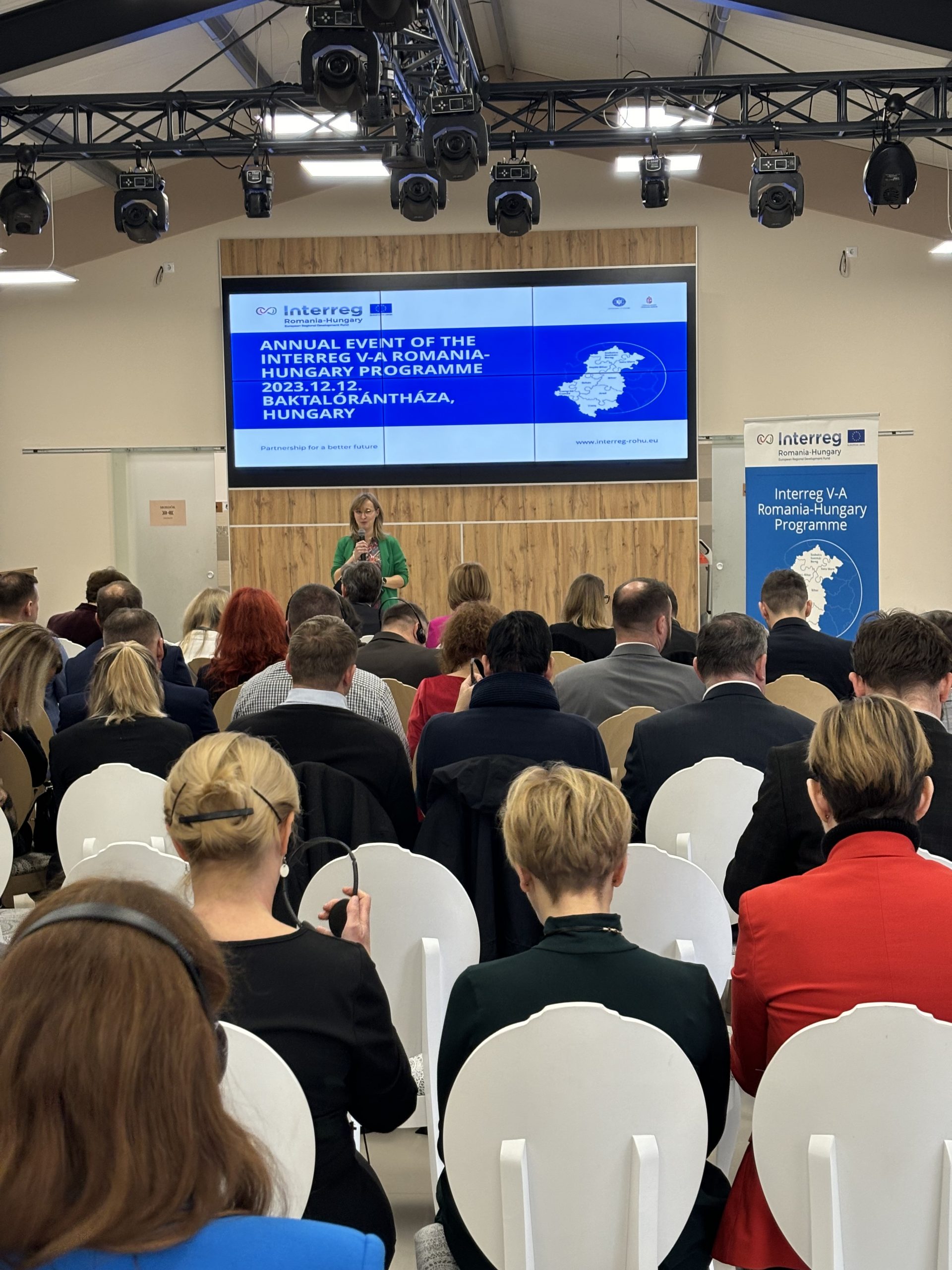


Yesterday, on December 12th, 2023, the Interreg V-A Romania-Hungary Programme officially closed its implementation in Baktalórántház, Hungary, during the Annual Event.
Representatives from the European Commission, Managing Authority, and National Authority, as well as ROHU beneficiaries, came together to celebrate the achievements of 7 years of Romanian-Hungarian cooperation and the joint efforts to improve the development of the cross-border region.
Since November 2016, ROHU V-A has organized events annually to promote the financed projects and their results. These events aimed to bring the Programme closer to the wider public and highlight the benefits of cross-border cooperation.
This year, at the end of the 2014-2020 programming period, the time to consider the entire activity in retrospect has arrived, this being the main topic on the Closing Conference Agenda.
The event was hosted by Mr Oszkár SESZTÁK, President of Szabolcs-Szatmár-Bereg County Council, and attended by over 100 participants who were also welcomed by representatives of the Programme.
In her welcoming speech, Ms Anna-Monika MODZELEWSKA, Programme Officer within DG Regio's Territorial Cooperation Unit 2 (European Commission), acknowledged the remarkable efforts of all the stakeholders involved in achieving the best possible performance in projects and Programme implementation, despite the unfavorable conditions caused by the pandemic crisis and the war in Ukraine. Additionally, she emphasized the importance of spending the funds allocated through the Programme, by December 31st, 2023.
Ms Camelia COPORAN, General Director, Directorate-General for European Territorial Cooperation (Ministry of Development, Public Work and Administration, Romania) and Head of the Managing Authority briefly commemorated the beginnings of the ROHU V-A cooperation, expressed her gratitude towards the Programme's and beneficiaries' representatives for their dedication and commitment, and hopped for further collaboration within the partnership for a better future.
On behalf of the National Authority, Ms Nikoletta HORVÁTH, Head of Department, Department for Cross-Border Interreg Programmes (Ministry of Foreign Affairs and Trade, Hungary) appreciated the valuable contribution made by local communities to the success of the current Programme’s implementation and referred to the future 2028-2034 programming period, that should focus on promoting the regional interest at European level, using a bottom-up approach to draft relevant regulations.
The ROHU V-A journey - the results achieved at the project and Programme level, as well as the significant impact as opposed to rather limited resources – was pictured by Ms Monica TEREAN, Head of Joint Secretariat, through emblematic outcomes, be those tangible (such as medical departments, water plants, new/upgraded roads or cycling paths, emergency intervention vehicles, visiting centers, better-protected areas, training or business centers), or intangible (access to improved medical services, population safeguarded by improved emergency response services, increased level of cross-border cooperation, etc.).
Best embodying the spirit of cooperation, the very core of Interreg Programmes, 8 out of the 33 people-to-people projects implemented under Interreg V-A Romania-Hungary were invited to present their accomplishments.
The participants learned in turn about drug prevention (ROHU180 – No Drugs), a better approach to the migration phenomenon at the Romanian-Hungarian border (ROHU183 - Safe Border, Safer Life), the inclusion of young people as a key social group in building sustainable and active cooperation (ROHU256 - Cross border youth community), the joint events organized in the fields of culture and sport (ROHU268 - Joint communities), the traditions, culture and history of the Slovak community (ROHU271 - Minority Question), the innovative solutions to common problems related to the social inclusion of marginalized communities (ROHU 277 - Chess Start Ro-Hu), promoting cultural diversity and shared traditions through artistic events (ROHU280 - Co-cultured), new, digital solutions to provide access to digitized cultural heritage and disseminate knowledge about the history and culture of the region (ROHU297 - Open Model of a Digital Museum Database).
Summarizing the lessons learned in the previous RO-HU cooperation programmes, and at the same time forecasting future trends and approaches on the basis of recently drawn conclusions, Ms Livia BANU, Executive Director of Oradea Regional Office for Cross-Border Cooperation for Romania-Hungary Border, highlighted the shift in focus from process to results, the importance of improved resilience and the impending (r)evolution towards a simpler, more intense, but most probably different future.
Upon the closure of ROHU V-A, we would like to extend our congratulations to all and every single ROHU project, express our gratitude to all ROHU beneficiaries, and hope for continued collaboration in the future.
We would also like to give a special thanks to our InfoPoint colleagues for the exceptional organization, and to all participants for being a part of this important event in Interreg V-A Romania-Hungary Programme lifecycle.
See you all in the context of the Interreg VI-A Romania-Hungary Programme!
